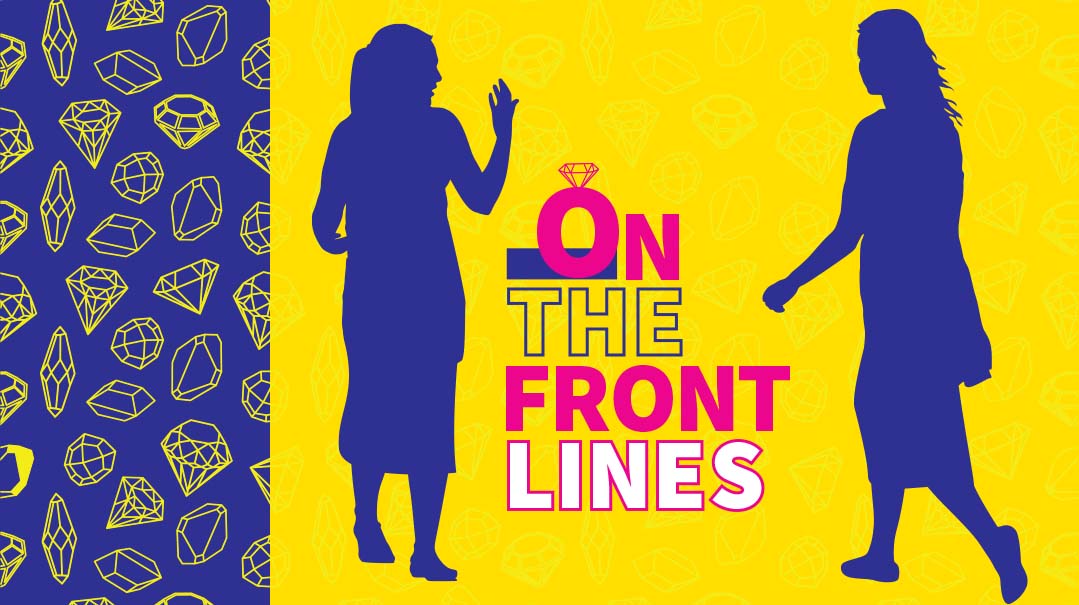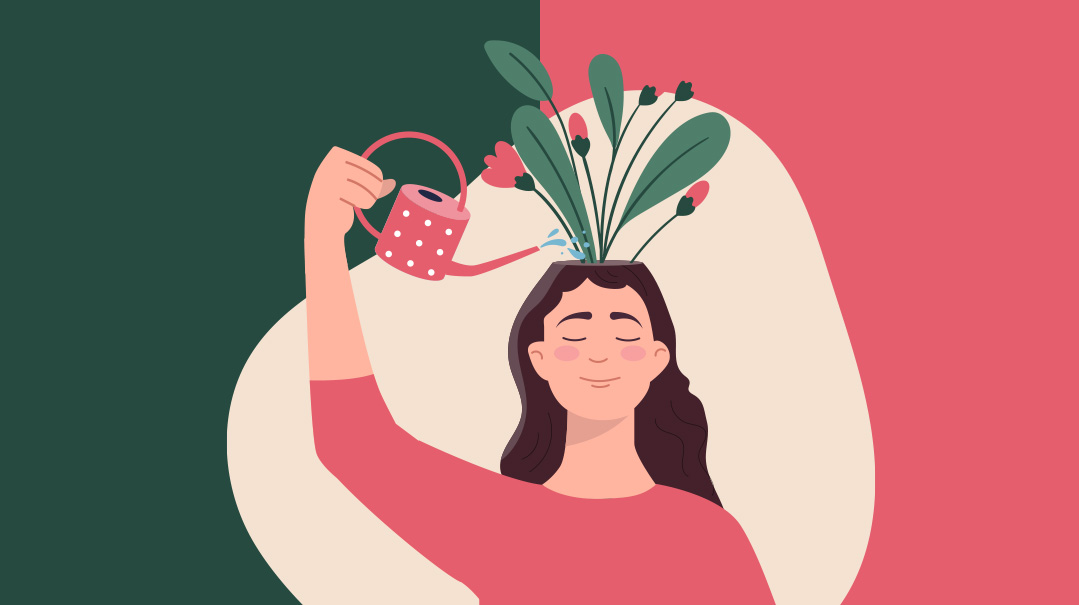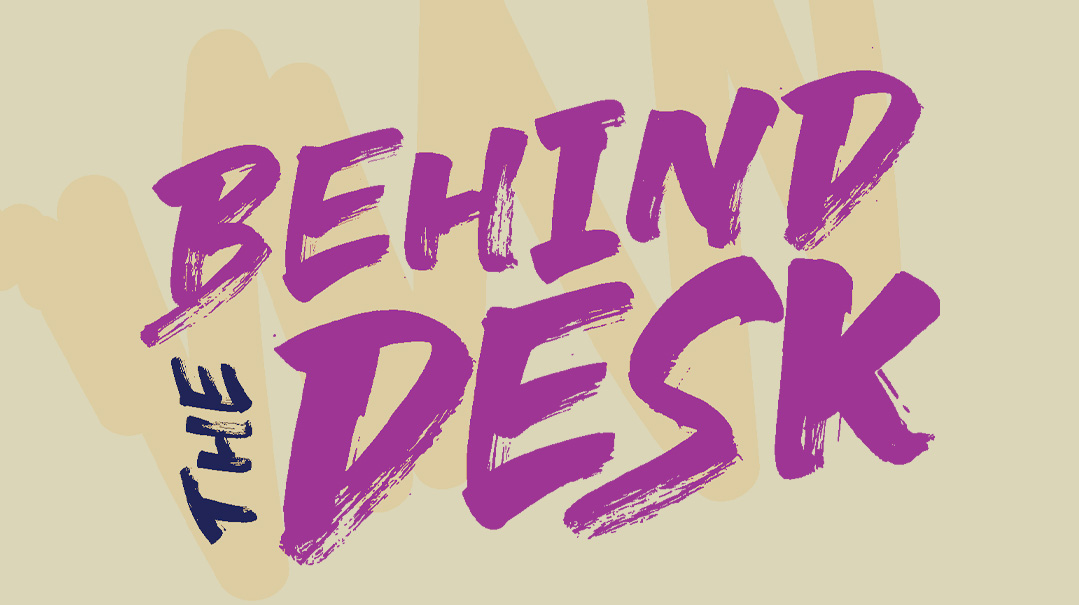On the Front Lines
| September 14, 2021Some special teens take the message of Succos to heart by going out into the world of kiruv

Succos is the time of year when we leave our homes and are enveloped in Hashem’s embrace: the succah. There are some special teens out there that take this message to heart by going out into the world of kiruv. They teach others about the majesty of our mesorah — what it means to be connected to Hashem, not just on Succos, but all year long
Miriam
My first experience with kiruv — although I didn’t know what it was called, at the time — was at my parents’ home every Shabbos. My parents always had guests over, from all kinds of backgrounds, and doing kiruv at the Shabbos table each week was standard for us.
Then I got involved with NCSY of Toronto. Although the NCSY youth programs in Toronto primarily attract public school kids, I used to join their trips because I loved the inspiration, the speakers, the music, the passion for Yiddishkeit. I looked up to the madrichos on those trips and was just awestruck — they were so smart, accomplished, passionate, and fun, confident in their Yiddishkeit, and on fire to give it over to others. I didn’t dream I would be able to be like them one day.
It was after seminary, when I was in college in New York, that I heard about a NCSY Toronto shabbaton in the area, and I decided to go as a madrichah. Although I’d never done it before, I was close enough to my own teenage years to remember what it was like and what I had appreciated about the madrichos on those trips. I knew how much I’d loved it when they approached me to ask how I was doing, or pulled me in to join the dancing, or were just full of ruach and energy. So I decided to be that kind of madrichah. On that first shabbaton, I made it my business to approach as many students as possible, ask them their names, and engage them in conversation. I tried to show passion and energy throughout the program and bring students into the dancing, singing, and ruach.
NCSY asked me to help out on more shabbatons, and of course, I said yes. I went on several trips with them and finally joined a five-week Israel trip. That was when my life changed, because I loved Israel and didn’t want to leave! I ended up enrolling in nursing school in Israel (another story!) and didn’t have much time for kiruv programs. But I missed it.
Then, someone asked if I would help out with a group that was on an Israel trip. They wanted to know if I’d meet the group in Tzefas and spend Shabbos there. And that’s where I met Rabbi Klatzko, a world-famous mekarev who was running one of his incredible Akiva trips to Israel.
As soon as I arrived, I loved it. I felt so connected with the students and the inspiring atmosphere. Even though I was in nursing school, for the rest of the trip, I kept finding time to rejoin the group and spend time with them, building relationships and being part of the kiruv process.
Rabbi Klatzko offered me the opportunity to join future trips as a madrichah… and so I was back in the world of kiruv and loving every minute of it.
There’s a two-part role in being a madrichah on these trips: There’re the practical logistics, like getting students up on time in the morning (admittedly not my strongest point), and then there’s just being there for them, connecting, being a role model, talking to them about Yiddishkeit and about life in general — you never know which conversation will have the biggest impact on their lives. I once had a conversation with a student on a bus about a random topic — and years later, I heard that she still remembered that conversation and how much it had influenced her.
Since I got married three years ago, I work for two kiruv programs in Israel — jInternship and JAM — but most of all, I’m involved in kiruv from my own home by hosting guests for Shabbos. When I join a program, I try to build warm relationships with the students and then invite them to keep the relationship going by coming for Shabbos, which can be the biggest inspiration of all — seeing a frum family’s Shabbos meal and the warmth and passion for Yiddishkeit.
And then there’s the music. I play violin, which always helped me contribute something unique to programs and trips. My husband actually plays music too — he’s a guitarist — and we find that music breaks down barriers where nothing else can. When I play for kiruv groups, when we sing songs like “Am Yisrael Chai,” I see students who have no connection to Torah and mitzvos starting to tear up and cry. They link arms, singing together, and it’s a beautiful moment: Despite everything Klal Yisrael has been through, we’ve survived, and we’re constantly striving to become closer to Hashem and bring others along with us.
Devorah
There were two reasons why I signed up to join Partners in Torah shortly after I finished seminary. One was that I wanted a taste of the world of kiruv, to see what it would be like to work with less affiliated Jews. The second was that I was (and still am!) super passionate about sharing the beauty of Torah with others. I’m a teacher, I love to give, and I enjoy relating to other people, so this felt like a great opportunity to channel those strengths for a very good cause.
Partners in Torah set me up with Sarah*, a teenage girl who lived nearby and wanted to learn more about Judaism. She came from a family with some Jewish affiliation — they were actually staunch Zionists who belonged to a shul — so she knew about Shabbos, Yom Tov, and some other basic information, but they weren’t observant.
We learned together once a week for around an hour. Over the year, we chose different topics or seforim to learn together, but the main thing was to talk, answer her questions, and let the conversation guide our learning. Although we often meandered into long conversations, we always had a book or sefer to learn from as a springboard. At one point, when we were using a sefer on the parshah written by Rabbi Yissocher Frand, I bought her Rabbi Frand’s Haggadah as a gift — she was so touched!
Sarah was a growth-oriented girl, and we really connected well. Even though we came from very different backgrounds, we found things in common. We talked a lot about school — I was working as a teacher, and she was still in high school, so we had lots to discuss. Even when we were learning together, and I was technically the “teacher,” it was more of a discussion than a lecture. I found our learning sessions enlightening, because they pushed me to think about things I hadn’t necessarily thought about before. We tend to take things for granted when we grow up frum — now I had to stop and think about everything I was teaching in order to explain it fully.
Sarah was quite shy by nature, so although eventually we built a strong connection, I did have to put in a lot of work to keep the conversation going (and deal with some awkward pauses). At the end of the year, when Sarah finished high school and was leaving for seminary in Israel, we decided to meet in person to say goodbye. We’d never actually met, although we spoke on the phone every week. What was interesting was that when we actually met, I had this sudden feeling of shyness — although I’m a really outgoing person in general. It was a funny moment of role reversal…
Sarah and I kept in touch a little after that. By now, we’ve kind of fallen out of touch, but I text her before Rosh Hashanah, and we both have good memories of our time learning together.
In fact, I had such a positive experience that I signed up a second time, for another partner — this one short-term. Kelly* was in university and came across a Partners in Torah booth on the campus. She was Jewish, and she thought, Hey, cool, I can do that. But she was super busy and didn’t really have the time for it, so it didn’t last very long.
From my part, the second time around was definitely easier, because I’d had the experience of doing it before. But because we didn’t learn together for too long, I didn’t build a connection with her like I’d done with Sarah. Still, both my experiences in the kiruv world were positive. They made me think, and grow, and I hope it was the same for my partners.
Debby
I knew about Oorah for years before I joined their summer camp. I’d seen their advertisements and video clips (I still remember the one that described Rav Chaim Mintz knocking on doors, urging parents to send their children to Jewish programs, and the one showing Oorah volunteers kashering kitchens), and I just wanted to be part of that transformation, helping people become closer to Hashem.
I was so excited when I was accepted as a counselor to The Zone, Oorah’s sleepaway camp. I was a counselor in the younger division, for a group of girls aged 10-12. On the one hand, it was like a regular camp program on the most incredible campus — sports, baking, zip lines, breakouts, activities, and the occasional trip off grounds. On the other hand, they told us at the staff orientation, the real purpose of camp is the TorahMates program — where every staff member is matched up with one or two campers as TorahMates to learn about Yiddishkeit together. Our goal was to build a real connection with our TorahMates and keep it up even after camp was over — to try and have a long-lasting effect on their lives. Throughout the year, TorahMates meet at Chill Zone locations on Motzaei Shabbos for amazing learning programs and activities. Camp was meant to give a taste of that experience and bring campers and staff on board to keep the learning going long after the summer’s end.
The very first time I met my campers, I was a little nervous, but as soon as they got off the bus and I got busy helping them with their luggage, I felt like I was already in the swing of things. Camp was so much fun, there was endless cheering, singing, music, themes, excitement — just like a regular camp, except that the kids come from various religious backgrounds, and we aimed to use this amazing opportunity to introduce them to Torah and mitzvos.
I was matched up with two TorahMates, Tiffy and Rachel. Tiffy was in my bunk, which made things a little challenging — I had to give her special attention and build up that close connection as her TorahMate, but I didn’t want the rest of the bunk to view it as favoritism. It was a hard balance. I tried to make her and Rachel feel special without singling them out in front of my bunk — like buying them a small gift when the staff went off grounds and giving it to them privately.
TorahMates time was the best time of day at The Zone. The staff hyped it up like crazy, so we all really looked forward to it every day. We were meant to use the time to learn together — they have a whole library of books to choose from — but my TorahMates and I ended up schmoozing a lot. They were young, just 10 and 11 years old, so we had a lot of discussions about Torah and Yiddishkeit and life in general.
Most times, I felt like I knew what to answer them when they had questions. When it was something bigger, and I wasn’t sure how to respond, we’d take it to the camp rav, Rabbi Davidowitz. But overall, I felt like I was doing the kiruv just by being — showing them how a frum girl acts, dresses, and speaks. The campers really look up to their counselors and especially their TorahMates — I remember one of my campers telling me she thought I was perfect! (Sweet innocence, right?) But it gave me a lot to live up to and really made me grow as a person. It’s a lot of work and a month of constant giving — but it was one hundred percent worth it.
Teens share:
Do’s and don’ts of kiruv
-Work on having love for every member of Klal Yisrael and showing them that you really care about them as a person. When they see that a frum person cares so much and is there for them, they look at the whole community differently. (Miriam)
-Never feel ashamed to stay true to your values. Just by being you, you can make all the difference. (Debby)
-Don’t be scared of not knowing all the answers. Many times, people who are less affiliated aren’t even looking for “answers,” they’re more interested in hearing your perspective on different topics. If you’re worried you don’t have the exact Torah hashkafah on a specific issue, just tell them, “You know, I never thought about that, but I can ask. This is really the kind of thing I rely on my rav for, so let’s see what he says.” That way you’re also demonstrating the importance of daas Torah. (Devorah)
-Connect to Hashem, and work on your own Yiddishkeit and self-awareness. The more you build yourself, the more you have to give over to others. (Debby)
-You might think, “I’m not good enough — who am I to go out there and teach Yiddishkeit?” Realize that you have so much to offer, and even more importantly, by working on your own growth in areas where you struggle, you will be able to understand their challenges better and be a genuine source of inspiration in overcoming them. (Miriam)
-When you’re studying with someone new to learning Torah, be open to going where the conversation takes you. Don’t insist on following the sefer or book that you planned to learn; let the conversation evolve naturally. At one point, my Partner in Torah and I planned to learn halachah together, but eventually it turned into a discussion of what halachah means and why it’s so relevant to our lives. It’s important to be able to go along with that — the underlying hashkafah and conversations are a crucial part of kiruv. (Devorah)
-It’s important not to come in with the attitude that you’re the giver and she’s the taker. See what you can learn from the other person as well — even if it isn’t Torah knowledge, maybe it’s the way they handle challenges or their good middos. My partner and I discussed workplaces and siblings and relationships… and I really appreciated her take on things. (Devorah)
-Sometimes, kiruv efforts seem to fail. It’s really hard to invest so much in a program and the students complain, or don’t get involved, or don’t seem to enjoy it. Just remember that this is your hishtadlus, and the results are from Hashem. Some of the biggest “fighters” against what we’re teaching on our trips are the ones who end up becoming the most committed — their fight actually showed that they were internalizing the message and struggling with applying this dramatic lifestyle change to their own lives. (Miriam)
-Torah is the truth, and it resonates. You don’t have to try to persuade or convince anyone. Just play your part, be a role model, open the conversation, and be there for them — and let Hashem do the rest. (Debby)
Do you have what it takes?
What characteristics do teens need to do kiruv successfully?
Devorah: The most important things are to be friendly, open-minded, and nonjudgmental.
Debby: You need to truly care and see beyond the externals to the neshamah within. Also, you need to be wholesome and self-confident in yourself and in your own direction in life.
Miriam: Good middos, authenticity, and being a growing person — a person who is constantly working on yourself. You don’t need a specific skill set to do kiruv — we all have what to offer. Take your talents, whether cooking, hiking, music, and use those to be mekarev others to Yiddishkeit.
(Originally featured in Teen Pages, Issue 878)
Oops! We could not locate your form.







